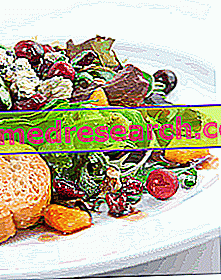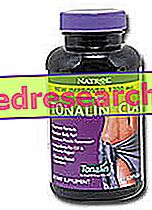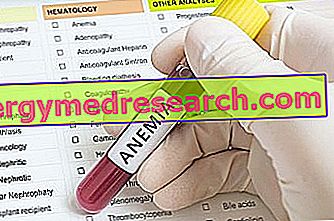The Ulcerative Colitis
Ulcerative colitis, also called ulcerative rectocolitis, is a CHRONIC inflammatory disease that affects the mucosa of the large intestine (colon-rectum).

NB . It is also quite common to find a strong emotional stress probably caused by the anxiogenic tendency of some subjects suffering from ulcerative colitis. This etiology would seem to be similar to that of the irritable bowel syndrome.
Ulcerative colitis manifests itself with MUCOEMATIC diarrhea, ie containing a good amount of intestinal mucus associated with blood; diarrheal discharges are more frequent at night and after meals, and are associated with abdominal abnormalities and feeling of constant need to defecate even though the rectum is already completely empty (TENESMO).
If left untreated, ulcerative colitis can determine the extent of the affected mucous area. with relative increase in symptoms. In addition to the enteric manifestations, the onset of high fever is frequent.
Ulcerative colitis therapy focuses mainly on inducing remission, and on maintaining and managing any disease-related complications.
The role of diet in ulcerative colitis
The most important trick in the prevention of ulcerative colitis is undoubtedly that of keeping INTEGRA the intestinal mucosa; however, the diet for ulcerative colitis changes significantly based on the state of the disease, or better:
if the ulcerative colitis is in a latent form, when it does NOT present the specific symptomatology, the goal of the diet is to MAINTAIN the intestinal balance UNLOWING the acute; on the contrary, if ulcerative colitis shows acute symptoms, the goal of the diet is to reduce enteric manifestations.
Diet in remission stages
In the latency or remission period, the alimentary therapy of ulcerative colitis aims to maintain intestinal efficiency and to enhance the "barrier" effect towards pathogens, acidity, food slag etc.
Peristalsis of the colon is favored by the right intake of dietary fiber, which should be introduced in the right doses and with the greatest possible regularity. In this regard, research institutes recommend taking about 30g / day (+/- 5g), which, depending on subjectivity, can be increased or decreased based on the individual peristaltic response (frequency of evacuations and stool consistency) . The fiber, appropriately divided between soluble (mostly contained in fruit and vegetables) and insoluble (mainly from cereals and derivatives), besides maintaining a "vitality" freedom of the colic musculature, feeds the physiological bacterial flora contributing significantly to the maintenance of the right trophism bacterial. Being useful molecules ALSO to the growth of physiological colonies ( PREbiotic function), foods containing fiber act synergistically with PRObiotics (yoghurt, fermented milks, supplements, drugs, etc.) for the maintenance of mucosal defenses; in case the patient does not use probiotic foods, consulting the doctor it is possible to supplement the intake of these bacterial strains with drugs or food supplements containing: L. acidophilus, B. bifidum, L. bulgaricus .
Also the food sources of omega-three (for the powerful anti-inflammatory action of these essential fatty acids), and those of glutamine, due to the trophic function of this amino acid on the intestinal mucosa, are particularly recommended in the diet of subjects suffering from ulcerative colitis.
Finally, remember that all the IRRITATING agents for the mucosa must be limited in the diet, therefore, if possible, it is advisable to REDUCE alcohol, coffee, highly spicy foods, very fatty foods, etc. drastically.
Diet in the acute phases
On the other hand, dietary recommendations change drastically during the period of acute ulcerative colitis. Having to comply with the increased water requirement (dehydration induced by diarrhea), the first trick is to introduce WATER frequently; moreover, we remind that mucoematic diarrhea favors nutritional malabsorption, therefore, it could become necessary the vitamin supplement associated with mineral salts (especially magnesium and potassium). Furthermore, in order to reduce diarrheal discharges as much as possible, in acute ulcerative colitis it is necessary:
- Reduce as much as possible the intake of dietary fiber which, as far as is necessary during maintenance, in the acute phase could favor the evacuation worsening the symptoms.
- Interrupt the PRObiotic integration with HYGIENIC issues; we know that probiotic bacteria are NOT potential pathogens, however, considering that in the feces there are traces of blood to indicate a lesion of the walls, for safety it is advisable not to favor the introduction of other bacteria with the feeding.
- Eliminate the LACTOSE from the diet because, due to the cleavage of the mucosa, it is possible that fermentation of lactose by intestinal bacteria is favored; all this would inexorably worsen the frequency and importance of diarrhea typical of ulcerative colitis.
- Obviously, more than in the latent phase, it is important to ELIMINATE all the foods that contain irritating molecules: alcohol, coffee, other nerves, irritating spices (especially pepper), grilled food or worse on embers, excessively fatty foods, sources of solanine, etc. .
NB : in cases of more severe acute cases it may be necessary to replace the feeding with parenteral nutrition; at the end of the most intense period, the ulcerative colitis patient will have to replenish the food a little at a time through an elementary diet (hypoallergenic foods and simple cooking) possibly with low residue of waste.
Bibbliografia:
- Internal systemic medicine - C. Rugarli - Elsevier Massono - pag 701



